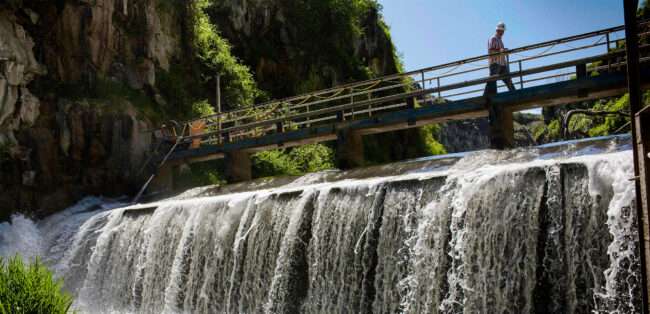Renewable energy for a sustainable future – this is the motto of one of the most famous world renewable energy companies. Enel Green Power SpA works around the globe and they work green. Using the power of the wind, sun, and water they are committed to taking from nature as much as it can be returned. They work sustainably.
Their energy business is purely from renewable energy plants. The company aims to improve electrification through sustainable energy sources because, as they say, they always put people and the environment first. Also, they invest in new technologies and are true clean energy envoys in not so clean energy business.
Enel as a green energy leader
And it seems that this policy pays off. According to Forbes magazine data, an Italy-based utility company this year has revenues of $99.4 billion, assets of $235.3 billion, and profits of $3.8 billion.
This is no wonder when behind the company’s policy stands a visionary as Francesco Starace who is Enel’s, Chief Executive Officer.
In 2015, long before the world could imagine an energy crisis as we experience now, Starace spoke before UN Conference on Climate Change. Then he clearly explained how different the world’s energy use will look in the future. That time “future” is what we live in today.

Enel’s chief farsightedness
In short, Francesco Starace then said that the world has to embrace innovative technologies. Those who listened to him then, now are thankful. Starace said that being old enough has had an opportunity to see two major breakthroughs in the energy industry. At first, those innovations were dismissed by the experts. But now, they are the norm in the business. His vision back then was that the world has to turn to renewables. The world faces major changes in technology, financial flows, and overall culture of living of the people, he said. And he was right.
He knew that today’s people’s lifestyle cannot tolerate energy hiccups. We need a stable grid, and constant energy to power our improved households, and factories cannot stop the working process. That’s why good engineers have to think about how to improve their turbines and how to store produced energy, which was Starace’s policy. And not to mention that he thought about how to prevent energy waste as much as possible. His famous sentence was: “A car factory doesn’t consume cars, but ours [production] use and discard energy.”
For Enel, consumers are above all
The chief of Enel also thought about consumers’ consumption control. Thus, Enel installed meters in homes and businesses across Italy more than a decade ago. The company anticipated a convergence of energy, telecommunications, water, gas, and other utilities. But that never happened in practice. Instead, the 37 million smart meters Enel currently operates are re-imagined as nodes for smart grids. Also, second-generation units will position Italy as a world leader in allowing customers to control how much energy they consume.
But not everyone lives in urban areas where everything is available.
Emblematic of Enel’s approach is the ENabling ELectricity initiative. It is a drive for electrification in remote, rural, and poor urban areas around the world. Already 2.5 million people benefited from improving infrastructure. It removed economic barriers and constructed new renewable energy capacity. An example of this new approach is an off-grid hybrid system that provides 24-hour electricity to a small Chilean village’s 100 or so families through PV solar, CSP, and mini-wind power plants.

Wind, sun, water…
Who owns the wind, or the sun? We are entering a new era in our relationship with energy, and the opportunities for our [power producing] industry are incredible if we learn how to innovate our present, innovating the future. That’s the business philosophy of Enel’s leader.
Enel SpA generates and distributes electricity as well as distributes natural gas. Its products involve green power, which is the production of energy from renewable sources. Enel also does thermal generation, which includes the production of electricity for grids. It poses infrastructure and networks and operates with power networks. Part of their business is an energy supply to homes and businesses. Enel makes global trading, i.e. manages integrated portfolios that include hedging activities to reduce risk and regulate energy supply.
In addition, the firm provides services to help businesses and communities utilize integrated technological solutions.
The Enel Green Power Company was established on December 6, 1962, and is based in Rome, Italy.

